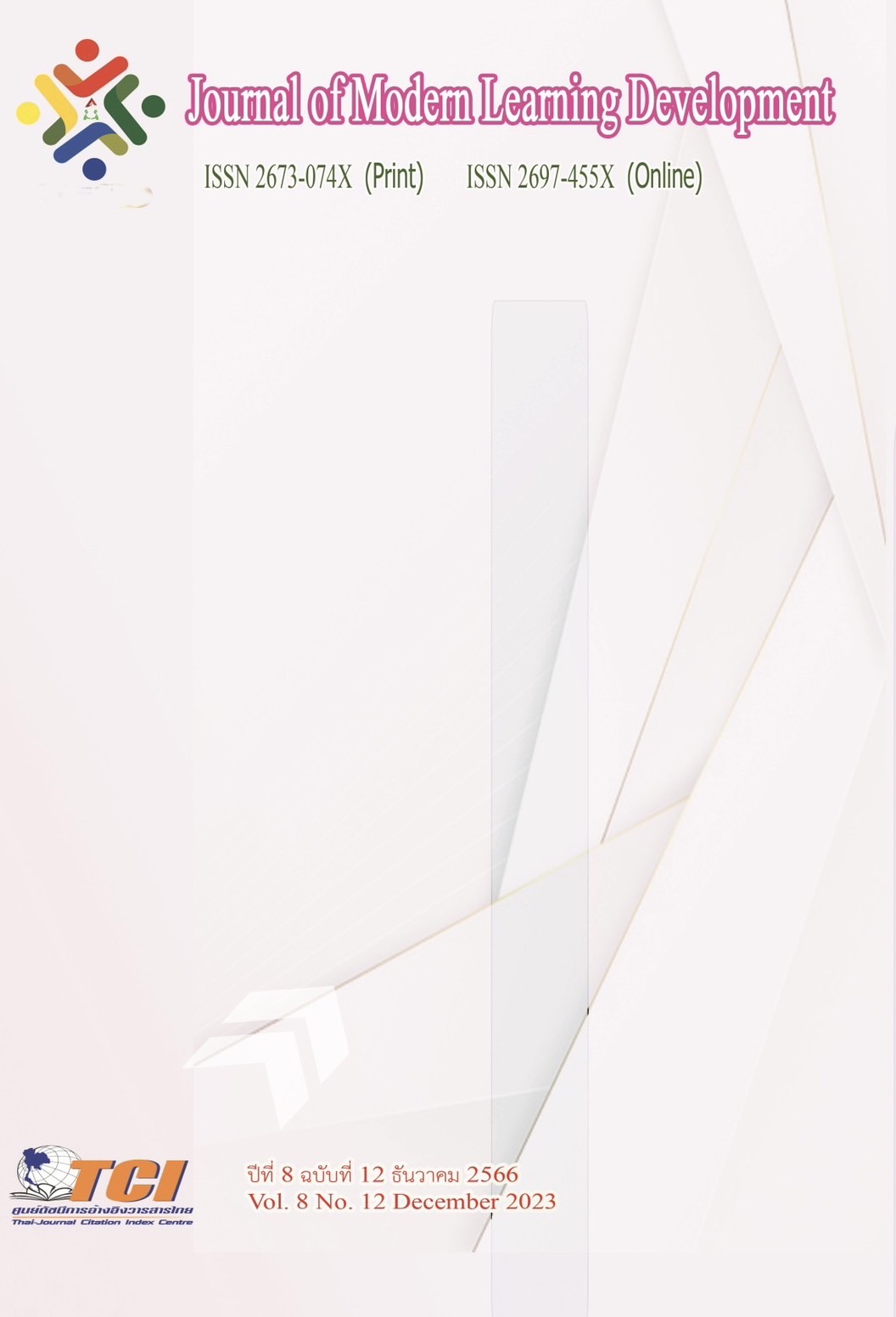The Research on the Impact of Organizational Learning on New Venture Performance
Main Article Content
Abstract
The objectives of this research were: (1) To Study the process and mechanism of the impact of organizational learning on new venture performance. (2)To Study the mediating effect of dynamic capabilities between organizational learning and new venture performance.(3)To Study the moderating effect of social networks between organizational learning and new venture performance. This study takes new ventures as the research object, applies questionnaire survey method to collect data. This study uses software such as SPSS and AMOS to scientifically analyze the survey data through reliability testing, validity testing, multi-level regression analysis and other methods, test the research hypotheses, and propose research conclusions.
The results found that: (1) Organizational learning has a significant positive impact on new venture performance. (2)Dynamic capabilities play a partial mediating role between organizational learning and new venture performance.(3)Social network positively moderates the relationship between organizational learning and new venture performance
Article Details
References
Albort-Morant, G., Leal-Millán, A., & Cepeda-Carrión, G. (2016). The antecedents of green innovation performance: A model of learning and capabilities. Journal of Business Research, 69(11), 4912-4917.
Al-Jinini, DK, SE Dahiyat and N Bontis (2019). Intellectual capital, entrepreneurial orientation and technical innovation in small and medium-sized enterprises. Knowledge and Process Management, 26(2), 69–85.
Ambrosini, V., & Bowman, C. (2009). What are dynamic capabilities and are they a useful construct in strategic management? International Journal of Management Reviews, 11(1), 29–49.
Antonelli, D, G Bruno, T Taurino and A Villa (2015) Graph-based models to classify effective collaboration in SME networks. International Journal of Sociology and Social PolicyProduction Research, 53(20), 37–41.
Argote, L., & Miron-Spektor, E. (2011). Organizational learning: From experience to knowledge. Organization Science, 22(5), 1123–1137.
Arthurs, J. D., & Busenitz, L. W. (2006). Dynamic capabilities and venture performance: The effects of venture capitalists. Journal of Business Venturing, 21(2), 195–215.
Balestrin, A, LM Vargas and P Fayard (2008) Knowledge creation in small-firm network. Journal of Knowledge Management, 12(2), 94–106.
Baltrunaite, V., & Sekliuckiene, J. (2020). The use of organisational learning practices in start-ups growth. Entrepreneurial Business and Economics Review, 8(1), 71–89.
Bianchi, G., Testa, F., Tessitore, S., & Iraldo, F. (2022). How to embed environmental sustainability: The role of dynamic capabilities and managerial approaches in a life cycle management perspective. Business Strategy and the Environment, 31(1), 312-325.
Bogers, M., Chesbrough, H., Heaton, S., & Teece, D. J. (2019). Strategic management of open innovation: A dynamic capabilities perspective. California Management Review, 62(1), 77-94.
Bouncken, RB, R Pesch and S Kraus (2015) SME innovativeness in buyer-seller alliances: Effects of entry timing strategies and inter-organizational learning. Review of Managerial Science, 9(2), 361–384.
Corbett, A. C. (2007). Learning asymmetries and the discovery of entrepreneurial opportunities. Journal of Business Venturing, 22(1), 97–118.
Cotic-Svetina, A, M Jaklic and I Prodan (2008) Does collective learning in clusters contribute to innovation? Science & Public Policy, 35(5), 335–345.
Dhir, S., & Dhir, S. (2018). Role of ambidexterity and learning capability in firm performance: A study of e-commerce industry in India. VINE Journal of Information and Knowledge Management Systems, 48(4), 517–536.
Dixon, S., Meyer, K., & Day, M. (2014). Building dynamic capabilities of adaptation and innovation: A study of micro-foundations in a transition economy. Long Range Planning, 47(4), 186-205.
Giniuniene, J., & Jurksiene, L. (2015). Dynamic capabilities, innovation and organizational learning: Interrelations and impact on firm performance. Procedia-Social and Behavioral Sciences, 213, 985-991.
Gnyawali, DR and BJ Park (2009) Co-opetition and technological innovation in small and medium-sized enterprises: A multilevel conceptual model. Journal of Small Business Management, 47(3), 308–330.
Helfat, C. E. (2022). Strategic organization, dynamic capabilities, and the external environment. Strategic Organization, 20(4), 734-742.
Hunt, S. D., & Madhavaram, S. (2020). Adaptive marketing capabilities, dynamic capabilities, and renewal competences: The “outside vs. inside” and “static vs. dynamic” controversies in strategy. Industrial Marketing Management, 89, 129-139.
Keith, N., Unger, J. M., Rauch, A., & Frese, M. (2016). Informal learning and entrepreneurial success: A longitudinal study of deliberate practice among small business owners. Applied Psychology, 65(3), 515–540.
Khan, O., Daddi, T., & Iraldo, F. (2020). The role of dynamic capabilities in circular economy implementation and performance of companies. Corporate Social Responsibility and Environmental Management, 27(6), 3018-3033.
Olanrewaju, A. S. T., Hossain, M. A., Whiteside, N., & Mercieca, P. (2020). Social media and entrepreneurship research: A literature review. International Journal of Information Management, 50, 90-110.
Ritola, I., Krikke, H., & Caniëls, M. C. (2022). Learning-based dynamic capabilities in closed-loop supply chains: an expert study. The International Journal of Logistics Management, 33(5), 69-84.
Santoro, G., Thrassou, A., Bresciani, S., & Del Giudice, M. (2019). Do knowledge management and dynamic capabilities affect ambidextrous entrepreneurial intensity and firms’ performance?. IEEE Transactions on Engineering Management, 68(2), 378-386.
Sawaean, F., & Ali, K. (2020). The impact of entrepreneurial leadership and learning orientation on organizational performance of SMEs: The mediating role of innovation capacity. Management Science Letters, 10(2), 369-380.
Vu, H. M. (2020). A review of dynamic capabilities, innovation capabilities, entrepreneurial capabilities and their consequences. The Journal of Asian Finance, Economics and Business, 7(8), 485-494.
Weaven, S., Quach, S., Thaichon, P., Frazer, L., Billot, K., & Grace, D. (2021). Surviving an economic downturn: Dynamic capabilities of SMEs. Journal of Business Research, 128, 109-123.


